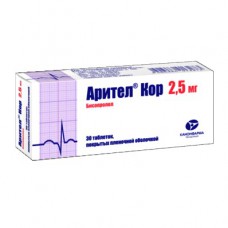Expiration date: 02/2026
COMPOSITION
Active substance: Bisoprolol.
SYNONYMS
Aritel, Bidop, Biol, Biprol, Bisogamma, Bisokard, bisoprolol, bisoprolol-OBL, bisoprolol-Luga, bisoprolol, Prana, bisoprolol-Teva, Bisopronkor, Concor, Concor Cor, Corbis, Kordinorm, Coronal, Niperten, Tiresias
PHARMACHOLOGIC EFFECT
Mode of action - antihypertensive, antianginal, antiarrhythmic. Selectively blocking beta1-adrenergic receptors, it has no intrinsic sympathomimetic and membrane stabilizing activity. Inhibits all heart functions reduce the heart rate, cardiac output and other Lowers the tone of sympathetic department of the vasomotor center, cardiac output, renin secretion, PR (chronic administration), and Sad Dad.. It increases the effective refractory period of the sinus and AV node slows conductivity of AV connection. Virtually no effect on lipid metabolism. It is metabolized in the "first pass" through the liver. Maximum concentration is achieved in 2-4 hours. Excreted by the kidneys, with the faeces. It is secreted into breast milk.
INDICATIONS
Hypertension, angina, myocardial period, chronic heart failure (moderately severe, stable without exacerbation during the last 6 weeks).
CONTRAINDICATIONS
Hypersensitivity, sinus bradycardia (less than 45-50 u. / Min), sick sinus syndrome, sinoatrial and AV blockade II-III degree, cardiogenic shock, severe and refractory to the treatment of severe heart failure, acute myocardial infarction, hypotension (Sad below 90 mmHg), severe obstructive respiratory failure, pregnancy, breast-feeding. Restrictions on the use: Chronic obstructive pulmonary disease, bronchial asthma, severe course, variant angina (Prinzmetal), a tendency to bradycardia, AV block I degree, a violation of the peripheral circulation (including Raynaud's syndrome), diabetes, hypoglycemia, hyperthyroidism, psoriasis , liver and renal function, acidosis, children's age (safety and efficacy of the children are not identified).
SIDE EFFECT
From the nervous system and sensory organs: dizziness, insomnia, fatigue, hypoesthesia, depression, drowsiness, anxiety, paresthesia (sensation of cold in the extremities), hallucinations, thought disorder, concentration, orientation in time and space, balance, emotional lability, noise ears, conjunctivitis, visual disturbances, reduced secretion of tear fluid, seizures. Cardio-vascular system and blood (blood, hemostasis): bradycardia, arrhythmia, palpitations, AV block, hypotension, heart failure, impaired microcirculation in the myocardium and limbs, intermittent claudication, vasculitis, agranulocytosis, thrombocytopenia, thrombocytopenic purpura. From the digestive tract: diarrhea, nausea, vomiting, dry mouth, dyspepsia, constipation, ischemic colitis, mesenteric thrombosis artery. From the respiratory system: cough, shortness of breath, and broncho-laryngospasm, pharyngitis, rhinitis, sinusitis, respiratory tract infection, respiratory distress syndrome. From the urogenital system: peripheral edema, decreased libido, impotence, Peyronie's disease, cystitis, renal colic. For the skin: rash, acne, ekzemopodobnye reaction, prurigo, reddening of the skin, rash, dermatitis, alopecia. On the part of metabolism: increased concentration of liver enzymes (AST, ALT), hyperglycemia or increased glucose tolerance, hyperuricemia, changes in the concentration of potassium in the blood. Other: pain, weight gain.
INTERACTION
The likelihood of violations of automaticity, conduction and contractility of the heart increases (each) on a background of amiodarone, diltiazem, verapamil, quinidine drugs, cardiac glycosides, reserpine, alpha-metildofy. Co-administration of dihydropyridine calcium channel blockers, especially in patients with latent heart failure increases the risk of hypotension and cardiac decompensation. Effectively lowers xanthines and sympathomimetics, rifampicin reduces the half-life, ergotamine derivatives potentiate the peripheral circulation. Incompatible with MAO inhibitors.
Dosage and Administration
Inside, in the morning on an empty stomach, without chewing. Dosage is appointed by the attending physician.
OVERDOSE
Symptoms: bradycardia, arrhythmia, hypotension, heart failure (shortness of breath, akrotsianoz, swelling), hypoglycemia, in severe cases - collapse. Treatment: gastric lavage and the appointment of absorbent, symptomatic therapy: atropine, beta-adrenergic agonist (isoprenaline), sedatives (diazepam, lorazepam) and cardiac (dobutamine, dopamine, epinephrine, norepinephrine) drugs, cardiac glycosides, diuretics, glucagon, etc. When. heart block - transvenous pacing, pacemaker connection.
SPECIAL INSTRUCTIONS
It is necessary to consider the possibility of masking the symptoms of hypoglycemia and hyperthyroidism during treatment. In severe hepatic dysfunction, acute renal failure, the dose should be reduced. Bisoprolol reduces the compensatory cardiovascular reactions in response to the use of general anesthetics and iodine-containing contrast agents. It is necessary to stop the drug for 48 hours prior to anesthesia or select an anesthetic with the least negative inotropic effect. Treatment should be stopped gradually, over about 2 weeks (possible withdrawal). Be wary of during the drivers of vehicles and people skills relate to the high concentration of attention. It is necessary to exclude the use of alcoholic beverages during treatment (risk of orthostatic hypotension). You can change the test results in laboratory studies.
STORAGE CONDITIONS
List B. Store at a temperature not exceeding 25 grams. With a dry, sheltered from the light and out of reach of children.


